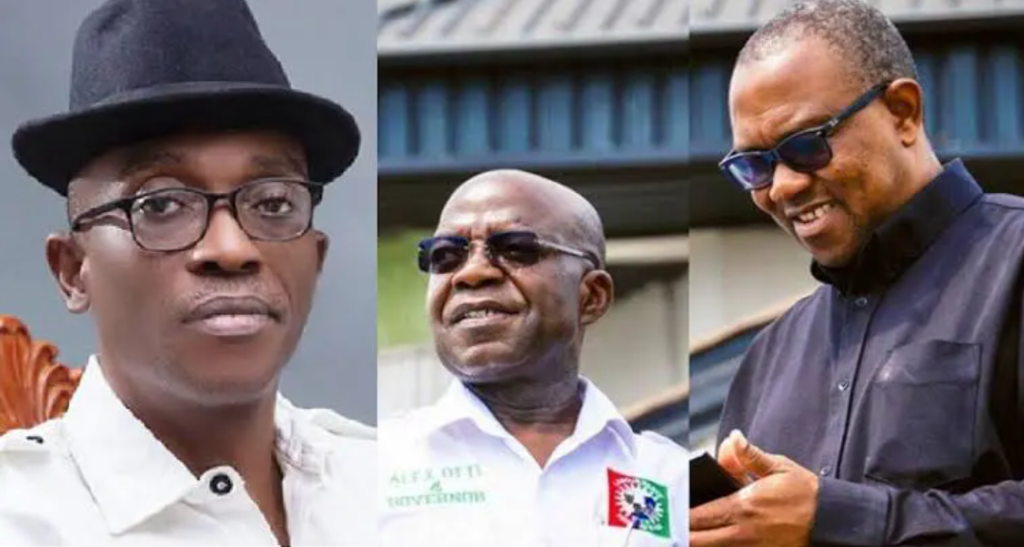The Labour Party (LP) finds itself embroiled in a deepening internal conflict, highlighting the fragility of the political coalition that propelled Peter Obi’s presidential bid. The dispute centers around control of the party machinery and future direction, with the Abure-led National Executive Committee (NEC) clashing directly with Obi and his supporters. This power struggle threatens to fracture the party and undermine its ability to effectively participate in future elections. The immediate catalyst for the current crisis is a planned stakeholders’ meeting organized by Obi and Abia State Governor Alex Otti. The Abure-led NEC has vehemently opposed this meeting, interpreting it as a direct challenge to their authority and a potential platform for undermining their leadership.
The Abure faction has gone beyond mere condemnation, threatening sanctions against Obi and Otti should the meeting proceed. This strong-arm tactic has further escalated tensions within the party, creating a public spectacle of internal discord. Despite the threats, Obi and Otti have remained defiant, signaling their intention to proceed with the meeting. This open defiance of the NEC’s authority underscores the deep divisions within the party and suggests a protracted power struggle. The Obi camp views the meeting as crucial for charting the future of the party, suggesting a divergence in vision from the Abure-led NEC. This difference in strategic direction further complicates the conflict, moving beyond mere power politics to encompass fundamental disagreements about the party’s future.
Adding fuel to the fire, the Abure-led NEC has already taken disciplinary action against a prominent Obi ally, Afam Ogene, the LP Caucus Leader in the House of Representatives. Ogene’s removal from his position, ostensibly for anti-party activities, can be interpreted as a preemptive strike against Obi’s influence within the party. This action further solidifies the perception of a targeted campaign to marginalize Obi and his supporters, raising concerns about the fairness and impartiality of the Abure faction. The NEC’s targeting of Ogene serves as a clear warning to other Obi loyalists and reinforces the impression of a deepening power struggle within the party.
The timing of this escalating conflict is particularly damaging for the Labour Party. Coming on the heels of a Supreme Court judgment related to the party’s leadership, it exposes internal weaknesses and raises questions about its long-term viability. The public airing of these internal disputes can erode public trust and undermine the party’s image as a unified force. This internal strife also distracts from the critical task of rebuilding and reorganizing after the 2023 election. Instead of focusing on policy development and strengthening party structures, valuable time and resources are being consumed by infighting.
The root of the conflict appears to lie in the struggle for control and influence within the party. The Abure-led NEC is asserting its authority and attempting to consolidate power, while Obi and his supporters are pushing back against what they perceive as an attempt to marginalize them. This power struggle is not uncommon in political organizations, especially after a major election, but the intensity and public nature of the LP’s conflict are particularly concerning. The Abure faction argues that their actions are necessary to maintain party discipline and ensure adherence to the party’s constitution. However, critics view their actions as an attempt to silence dissent and consolidate control.
The future of the Labour Party remains uncertain amidst this ongoing internal conflict. If the two sides cannot find a way to reconcile their differences, the party risks a damaging split. Such a split could significantly weaken the party’s electoral prospects and diminish its influence in Nigerian politics. A potential outcome is the emergence of two separate factions, each claiming legitimacy and competing for resources and support. This scenario would further fragment the opposition and benefit the ruling party. Another potential outcome is a prolonged period of internal strife, characterized by legal battles and political maneuvering. This scenario would further drain the party’s resources and distract from its core mission.
The key to resolving this conflict lies in open communication, compromise, and a willingness to put the interests of the party above personal ambitions. Both sides need to engage in constructive dialogue and find common ground. A mediated solution, involving respected neutral parties, could help facilitate reconciliation and prevent further escalation of the conflict. The longer the conflict persists, the greater the damage to the Labour Party and the more difficult it will be to rebuild trust and unity. The ultimate outcome of this power struggle will significantly shape the future of the Labour Party and its role in Nigerian politics.


